Annual Report 2023-2024
PDF Format [1.1 MB]
Table of Contents
Vision, Mission, Mandate and Strategic Objectives
The Complaint & Review Process
- Chair-Initiated Complaints
- Systemic Investigations
- Service Standards
- Public Complaints
- Reviews of the RCMP's Handling of Public Complaints
- Multiple Complaint Subject Member Project
- Heads of Police Oversight Agencies Annual Meeting
- Canadian Association of Civilian Oversight of Law Enforcement
Transparency and Accountability
- Searchable Findings & Recommendations
- Provincial/Territorial Reports on RCMP Public Complaints
- Administration of the Public Complaint Process
Message from the Chairperson

I am pleased to present the 2023–2024 Annual Report for the Civilian Review and Complaints Commission for the RCMP (CRCC).
Year after year, the number of complaints filed by members of the public has risen and the program integrity funding provided in fiscal year 2022–2023 has gone a long way to addressing this significant increase in public complaints.
However, with Bill C-20, An Act establishing the Public Complaints and Review Commission and amending certain Acts and Statutory instruments, on the horizon, it became apparent that we needed to improve our process for receiving complaints. As a result, the CRCC undertook a review of its processes, including conducting a Lean assessment, with a focus on streamlining analysis and decision making. The results are encouraging, with what appears to be a much shorter time frame for complaint processing. Moving forward, the CRCC will continue to review its processes and ensure that it delivers its services to Canadians in the most effective and efficient manner.
Of note this past year, the CRCC added a much‑needed permanent position—Senior Advisor, Indigenous Affairs—to the team. This position is critical to the CRCC gaining a better understanding of the systemic barriers that exist and prevent Indigenous peoples from making use of the complaint system. We understand that the CRCC needs to change its process for accepting complaints, but such change can only happen if we can define the change required and map out the way forward. I look forward to adapting our processes to make them more relevant and available for all Canadians.
Following our review of the RCMP's bias‑free policing model in December 2022, a new public complaint category was created.
Previously, complaints that alleged biased or discriminatory behaviour were often classified as improper attitude. Starting April 2024, RCMP public complaint investigators will categorize these complaint allegations under "bias" when it is alleged that "actions, inactions or decisions made by a member resulted in the inequitable treatment of a person or group."
This recommendation aims to facilitate the RCMP's data collection, analysis and reporting, allowing for better identification and understanding of potential trends in biased policing.
While the CRCC is generally supportive of steps being taken to improve bias-free policing in the RCMP, we will closely monitor the introduction and management of the allegation, as well as policy compliance and training effectiveness of the RCMP's bias-free policing model.
Work continues to increase the CRCC's ability to extract, analyze and present data to inform initiatives such as the Multiple Complaint Subject Member project and ensure that CRCC decisions are data driven.
The CRCC hosted a successful Heads of Police Oversight Agencies in October 2023. This annual meeting provides a forum for police oversight agencies at the Federal, Provincial and Territorial level to discuss best practices and identify emerging trends.
This annual meeting also shines a spotlight on the differences between the legislation that governs police oversight and review agencies across the country. These differences can make navigating the various systems difficult for Canadians who have negative interactions with police. While the various complaint bodies committed many years ago to a "no wrong door" policy when it comes to taking complaints from members of the public, there is still work to be done.
Canadians should know what to expect when they file a complaint about police misconduct. A greater harmonization of process and more importantly, the legislated ability for all organizations to work together towards excellence in policing are both critical to improving public trust.
Vision, Mission, Mandate and Strategic Objectives
The Civilian Review and Complaints Commission for the RCMP (the CRCC) is an agency of the federal government, distinct and independent from the RCMP.
VISION: The CRCC will become the national leader for independent review of policing activities through the provision of a relevant, timely and transparent complaint process.
MISSION: Deliver a robust complaint process which holds the RCMP accountable for its activities and the conduct of its members.
MANDATE: As set out in Parts VI and VII of the Royal Canadian Mounted Police Act, the mandate of the Commission is to:
- receive complaints from the public about the conduct of RCMP members;
- conduct reviews when complainants are not satisfied with the RCMP's handling of their complaints;
- initiate complaints and investigations into RCMP conduct when it is in the public interest to do so;
- review specified RCMP activities;
- report findings and make recommendations; and
- promote public awareness of the complaint process.
STRATEGIC OBJECTIVES
- Strengthening the public complaint process.
- Strengthening the Commission's review and investigative capacity.
- Enhancing relations with provincial and territorial governments, as well as police and federal review bodies.
- Conducting specified activity reviews of RCMP programs, policies and practices.
- Increasing outreach, public education and engagement efforts.
Land Acknowledgement
The CRCC acknowledges that our offices, located in Ottawa and Vancouver, are on the traditional unceded, unsurrendered territory of the Anishinaabe Algonquin People, šxʷməθkʷəy̓əmaɁɬ təməxʷ (Musqueam), Skwxwú7mesh-ulh Temíx̱w (Squamish), səl̓ilwətaɁɬ təməxʷ (Tsleil-Waututh), S'ólh Téméxw (Stó:lō), Stz'uminus, Hul'qumi'num Treaty Group and Coast Salish Nations.
The Complaint & Review Process
The Public Complaint Process
The CRCC accepts complaints about the on-duty conduct of RCMP members from individuals:
- Directly involved;
- Who witnessed the conduct itself;
- Authorized to act on behalf of the complainant.
When a complaint is made, typically the CRCC sends the complaint to the RCMP for investigation. The RCMP investigates the complaint and reports back to the complainant.
The Chairperson can also initiate a complaint. These complaints allow the Chairperson to set the scope of the investigation of the complaint. These complaints are typically investigated in the same manner as a complaint from a member of the public.
A complaint should be made within one year of the alleged conduct occurring.
********
Requests to review the RCMP's handling of a public complaint should be made within 60 days of receiving the RCMP's formal response to a complaint.
The Review Process
If an individual is not satisfied with the RCMP's handling of their complaint, they may request that the CRCC conduct a review of the RCMP's investigation.
If the CRCC is satisfied with RCMP's investigation, the Chairperson issues a Satisfied Report, thereby ending the review process.
If the CRCC finds the RCMP did not conduct a thorough investigation, the Chairperson can request that the RCMP investigate further or determine the CRCC will do so itself.
If the CRCC is not satisfied with the RCMP's handling of the complaint, the Chairperson will issue an Interim Report, outlining various findings and recommendations directed at the RCMP.
Once the Interim Report has been reviewed by the RCMP, the RCMP Commissioner issues a report to the CRCC identifying which recommendations the RCMP will act on. If no action is to be taken, the RCMP Commissioner must provide reasons.
After receiving the RCMP Commissioner's Response, the Chairperson considers the RCMP's position and prepares a Final Report. This completes the CRCC's review process.
Process Flowchart
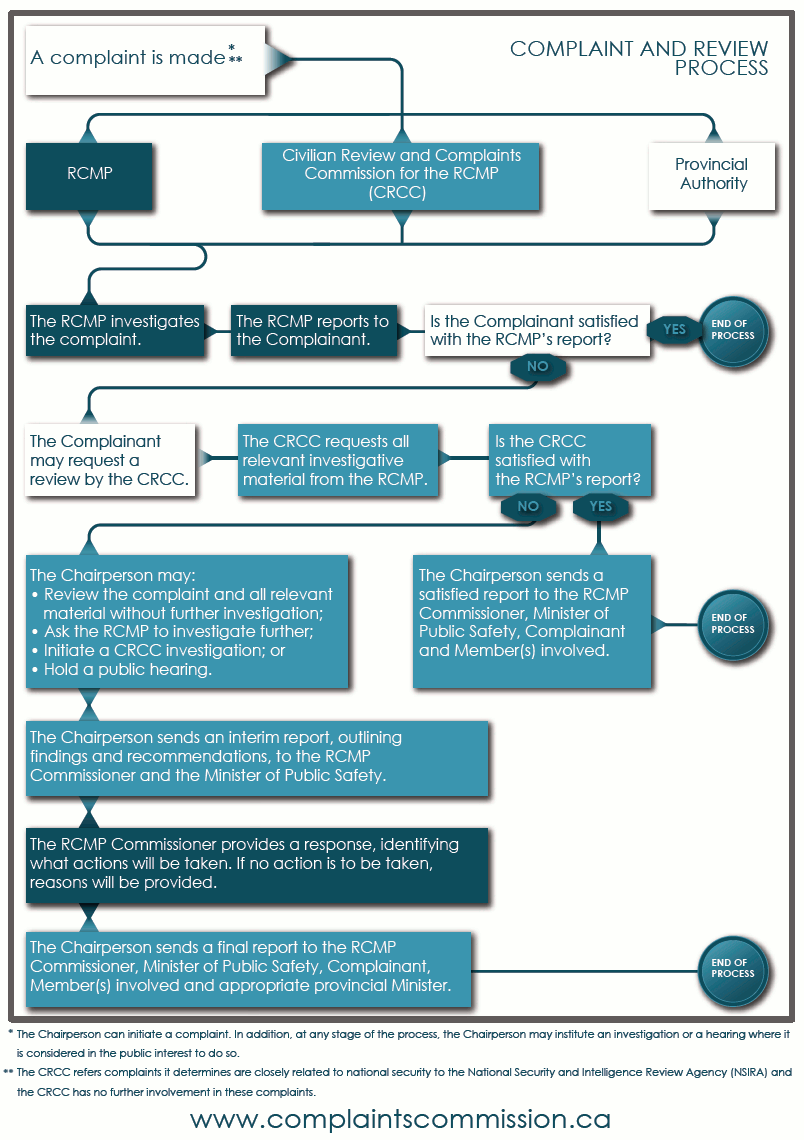
Text Version
1. A complaint is made to either:*
- The RCMP
- The Civilian Review and Complaints Commission for the RCMP (CRCC)
- The provincial authority responsible for receiving complaints against police in the province in which the subject of the complaint took place.
2. The RCMP investigates the complaint.
3. The RCMP reports to the Complainant.
4a. If the Complainant is satisfied with the RCMP's report, this is the end of the process.
4b. If the Complainant is not satisfied with the RCMP's report, the Complainant may request a review by the CRCC. The CRCC requests all relevant investigative material from the RCMP.
5a. If the CRCC is satisfied with the RCMP's report, the Chair sends a satisfied report to the RCMP Commissioner, Minister of Public Safety, Complainant and Member(s) involved. This is the end of the process.
5b. If the CRCC is not satisfied with the RCMP's report, the Chair may:
- Review the complaint and all relevant material without further investigation;
- Ask the RCMP to investigate further;
- Initiate a CRCC investigation; or
- Hold a public hearing.
6a. Following its review, if the Commission is satisfied with the RCMP's handling of the complaint, the Chairperson issues a satisfied report to the RCMP Commissioner, Minister of Public Safety, Complainant and Member(s) involved, thereby ending the review process.
6b. If, at the conclusion of the review, the Commission is not satisfied with the RCMP's handling of the complaint, the Chairperson will issue an interim report outlining various findings and recommendations directed at the RCMP, which will be sent to the RCMP Commissioner and the Minister of Public Safety.
7. If an interim report is sent, the RCMP Commissioner gives notice identifying what actions will be taken. If no action is to be taken, reasons will be provided.
8. The Chairperson sends a final report to the RCMP Commissioner, Minister of Public Safety, Complainant, Member(s) involved, and the appropriate provincial Minister. This is the end of the process.
* The Chairperson can initiate a complaint. In addition, at any stage of the process, the Chairperson may institute an investigation or a hearing where it is considered in the public interest to do so.
** The CRCC refers complaints it determines are closely related to national security to the National Security and Intellgence Reivew Agency (NSIRA) and the CRCC has no further involvement in these complaints.
Enhanced Accountability
In addition to accepting complaints about the on-duty conduct of RCMP members from individuals and reviewing the RCMP's investigation if the individual is not satisfied with the RCMP's handling of their complaint, the CRCC has two broad powers that ensure the RCMP are publicly accountable: initiating a complaint and conducting systemic reviews of RCMP activities.
Chairperson-Initiated Complaints
If the Chairperson is satisfied that there are reasonable grounds to investigate the conduct of an RCMP member(s), they may initiate a complaint. As with a complaint filed by a member of the public, these complaints are typically forwarded to the RCMP for investigation.
If, however, the Chairperson determines that it is not in the interest of the public for the RCMP to investigate a complaint, the CRCC investigates the complaint. This applies to complaints made by the public as well as Chair-initiated complaints.
RCMP Member Conduct during an Interaction in Kinngait, Nunavut
In August 2020, the CRCC initiated a complaint regarding the conduct of RCMP members involved in an incident where a man was struck by a moving RCMP vehicle and assaulted in cells by another detainee.
In its response to the CRCC's investigative report, the RCMP agreed that the lack of space for prisoners at the Kinngait Detachment created an unsafe environment for detainees, RCMP members and detachment staff, and that it was unreasonable for the detachment to be in this condition.
Further, the RCMP accepted the CRCC's recommendations that:
- The RCMP should issue a bulletin emphasizing that potential head injuries to prisoners must be approached with the utmost seriousness, that RCMP members should err on the side of caution in seeking prompt healthcare assessments in such situations, and that RCMP members must be cognizant that intoxication may mask the symptoms of an underlying head injury.
- The RCMP should consider completely replacing the Kinngait Detachment building.
- The RCMP should ensure adequate staffing of all its detachments, including the Kinngait Detachment.
- The RCMP should enter into immediate discussions with the Government of Nunavut and other partners to ensure that sufficient resourcing and funding is provided to its Nunavut detachments so that an adequate level of service is provided at the Kinngait Detachment and in any other Nunavut detachments facing similar circumstances.
RCMP Arrest and Detention of Neurodiverse Alberta Teen (ongoing)
In November 2022, the Chairperson initiated a complaint regarding the arrest and detention of a neurodiverse youth by RCMP members in Alberta.
The RCMP's investigation is examining if, among other things:
- reasonable steps were taken to prevent the youth from self-harming;
- training is provided to members on recognizing and interacting with neurodiverse people;
- the RCMP has national and divisional policies, procedures and guidelines pertaining to interactions with people with neurodiversity.
The RCMP's investigation was paused while the Alberta Serious Incident Response Team (ASIRT) conducted a criminal investigation into the RCMP members' conduct.
In March 2024, ASIRT released its decision into the matter, noting that it had found reasonable grounds to believe that an offence may have been committed by one or more RCMP members.
However, the Alberta Crown Prosecution Service recommended that no charges be pursued.
This decision allowed the RCMP to complete its investigation and in May 2024, the RCMP delivered its report to the CRCC.
The CRCC is reviewing the RCMP's report and will issue its Final Report in due course. The CRCC's Final Report will be made public.
RCMP Handling of Sexual Assault and Death of Nova Scotia Woman (ongoing)
In June 2022, the CRCC initiated a complaint into the RCMP's handling of the sexual assault and threats to the safety of Ms. Susan Butlin of Bayhead, Nova Scotia.
The CRCC's investigation is examining, among other things:
- the circumstances leading up to Ms. Butlin's death;
- the adequacy of supervision, policies, procedures, and training pertaining to sexual assault investigations;
- whether any myths or stereotypes about sexual assault influenced the response of RCMP members.
The CRCC interviewed 36 witnesses and gathered over 20,000 pages of documentary evidence. The CRCC is currently reviewing and analysing the evidence gathered and preparing its report about the matter.
To learn more about these investigations, visit the CRCC website.
Systemic Investigations
The CRCC has the authority to conduct reviews of specified RCMP activities to ensure that they comply with legislation, regulation, ministerial direction, or RCMP policies, procedures or guidelines.
The RCMP "E" Division Community-Industry Response Group (C-IRG)
This systemic investigation of the C-IRG was initiated in March 2023 and examines the effectiveness of C-IRG's governance and command structure, as well as assessing whether C-IRG operations were carried out in accordance with legal standards, policy requirements, and leading practices.
More about this systemic investigation is available here.
Status of the Investigation
- While delays in receiving relevant materials persisted throughout 2023, improvements in this regard are notable and the investigation is progressing.
- To date, the CRCC has received and is analysing thousands of documents as well as more than 17,000 videos and images.
What We Heard Report
- The CRCC hired an Indigenous-owned law firm to interview individuals and groups who have had interactions with C-IRG.
- Information derived from the interviews will be compiled into a report and may be used to exemplify the CRCC's findings and inform any recommendations.
Public Complaints about C-IRG
As of March 2024, the CRCC received 573 public complaints related to the RCMP's "E" Division C-IRG injunction enforcement operations.
Of these public complaints:
- 121 were accepted
- 86 public complaint investigations are complete
- 35 public complaint investigations by the RCMP remain ongoing
- 10 requests for CRCC review have been received
Information derived from the public complaints and any reviews will also inform the CRCC's systemic investigation.
Systemic investigation recommendations can include:
- That the RCMP implement more widely a method, procedure or protocol worthy of emulating;
- That RCMP policies, procedures, or guidelines be developed, clarified or amended;
- That the RCMP develop, amend or modify training for members.
The RCMP's Handling of the Public Complaint Process in Nunavut
This systemic review was launched in August 2022 and examines the RCMP's handling of the public complaint process in Nunavut. More information about this systemic investigation is available here.
Status of the investigation
- The investigation is complete, and the report is being drafted.
- The investigation included identifying, obtaining and reviewing relevant RCMP records, reports, policy, and training documents.
- CRCC investigators interviewed:
- RCMP members involved in the public complaint process in Nunavut.
- RCMP staff at National Headquarters in the National Public Complaint Division.
- Individuals from Nunavut familiar with the RCMP public complaint process, including a territorial government official.
- CRCC investigators reviewed public complaint files in Nunavut for the timeframe April 1, 2018, to March 31, 2022.
- The CRCC contracted with NVision Insight Group to conduct qualitative, community-based research as part of a review of the RCMP's handling of the public complaint process in Nunavut. A key component to the project was ensuring Inuit and community representation in the qualitative research process, which was independently designed and implemented by NVision's consulting team in Iqaluit.
- The information obtained from the records, interviews, file review and the report completed by NVision will inform the CRCC's report.
Since 2017, the CRCC has completed five systemic investigations of RCMP programs or activities.
- RCMP Bias-Free Policing Model
- RCMP Policies and Procedures regarding Street Checks
- RCMP Use of Crime Reduction-Type Units
- RCMP Policies and Procedures regarding Strip Searches
- Workplace Harassment in the RCMP
To learn more about these investigations, visit the CRCC website.
Findings and Recommendations
RCMP responses to CRCC reports outline which of the CRCC's findings have been accepted and what remedial measures are being actioned to address CRCC recommendations. In 2023-24, the CRCC's findings and recommendations led the RCMP to take significant remedial steps, including:
- Improvements to the investigation of sexual assaults by:
- Requiring that all members tasked with investigating such offences successfully complete the Sexual Offences Investigations course (23-175 *).
- Undertaking to amend the RCMP's policy on sexual offences to require that, in those cases where there is a change in investigator, the victim be informed of the change as soon as practicable, and that the new investigator contact the victim, without delay (23-175*).
- In a case where an incomplete investigation was conducted into a youth's report of sexual assault, requiring the involved RCMP members to receive additional training on the investigation of sexual assaults on young persons, and conducting a file review of their past sexual assault investigations to ensure other investigations did not suffer from similar failures (24-050*).
- In another case of an unreasonable investigation into a sexual assault, agreeing to submit the investigation to its national Sexual Assault Review Team for an expert file review to determine if further investigation or charges might be appropriate, and ensuring that victim services be offered by the RCMP detachment involved in all cases involving sexual offence complaints (23-097*).
- Agreeing to improve the way that critical information is displayed through the Canadian Police Information Centre (CPIC) database. In the case reviewed by the CRCC, concerns about the way information was displayed led an officer to miss a safety-critical CPIC message. The RCMP Commissioner indicated that the types of enhancements recommended by the CRCC would be included in a future version of the CPIC system (24-008*).
- Providing operational guidance and training to the leadership of an RCMP detachment about the conduct of public complaint investigations in accordance with the guidance from the RCMP's National Public Complaints Guidebook, including the requirement to avoid conflicts of interest (23-145*).
*A summary of the CRCC complaint review referenced is available on our website
Over the course of the past year, the RCMP has finalized the implementation of two significant CRCC recommendations that have repeatedly been issued:
- Changing RCMP policy concerning prisoner care and handling, such as the provision of adequate meals, blankets and mattresses, access to showers, reasonable medical attention and access to medications.
- Revising RCMP policy on strip searches to ensure that strip searches are conducted in private and are not live-monitored and providing additional training to RCMP members
Monitoring of the Implementation Status of Recommendations to the RCMP
The RCMP sends biannual updates to the CRCC regarding the implementation of CRCC recommendations.
Since FY 2020-21, the RCMP has supported 1,147 of the CRCC's recommendations. Of those:
- 973 have been implemented by the RCMP
- 49 could not be implemented despite being supported**
- 113 remain outstanding
- 12 have an unknown status
The RCMP publishes an overview of the status of each CRCC recommendation that it has committed to implementing on its website.
**The majority of these could not be implemented because the individual who filed the complaint had passed away or the RCMP member had retired, resigned or was on long-term leave with no expected return to work date.
Bill C-20: An Act establishing the Public Complaints and Review Commission and amending certain Acts and statutory instruments
Bill C-20 introduced in May 2022 includes a statutory requirement for the RCMP (and the Canada Border Services Agency) to provide an annual report to the Minister outlining the status of the implementation of our recommendations.
Year in Review
Service Standards
The CRCC and the RCMP have an Operational Memorandum of Understanding (MOU) setting out, among other things, service standards aimed at providing the public with timely reports into concerns about RCMP member conduct.
The full terms of the MOU are available on the CRCC's website
| Public Complaint Process | Service Standard | Results |
|---|---|---|
The CRCC forwards public complaints it receives to the RCMP |
10 business days from the date the CRCC receives all the information necessary to determine if the complaint meets the criteria set out in s. 45.53 of the RCMP Act |
38% of complaints were sent to the RCMP within the 10-day service standard |
The RCMP investigates and delivers a report to the complainant |
The RCMP has an internal service standard* of 120 days. |
65%* of complaint investigations were finalized within the RCMP's internal service standard |
Review Process |
||
After receiving a complaint review request, the CRCC notifies the RCMP and requests relevant materials |
10 days |
74% of requests for review were sent to the RCMP within the 10-day service standard |
The CRCC conducts its review and issues either:
|
120 business days from the date the CRCC receives the relevant materials from the RCMP and the individual who files the complaint |
33% of CRCC Satisfied & Interim reports were completed within the 120-day service standard |
The RCMP responds to the CRCC Interim Report |
Within 6 months |
100% were received within the 6-month service standard |
The CRCC issues its Final Report |
30 business days after the CRCC receives the RCMP Commissioner's Response |
97% of CRCC Final reports were delivered within the 30-day service standard |
In 2023-24, the RCMP provided 56 responses to CRCC Interim reports. |
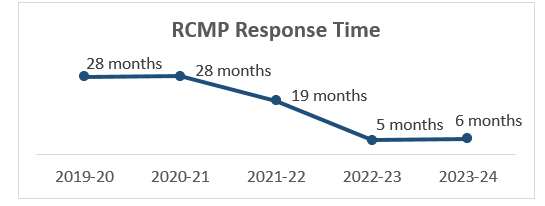 |
|
Public Complaints
4,500 public complaints were filed
3,157 were sent to the RCMP for investigation
1,295 did not meet the criteria set out in Part VII of the RCMP Act
48 were still under assessment at fiscal year-end to determine if they meet the criteria set out in Part VII of the RCMP Act
The CRCC undertook an audit of its case management system in 2023 to examine approximately 1,500 complaint records dating back to 2019.
As a result of the audit, 90 complaints were forwarded to the RCMP for investigation and 400 were refused, as they did not meet the criteria set out in Part VII of the RCMP Act.
Public Complaints – Five-year Trend
The numbers presented in the table below reflect updates to complaint statistics from previous years.
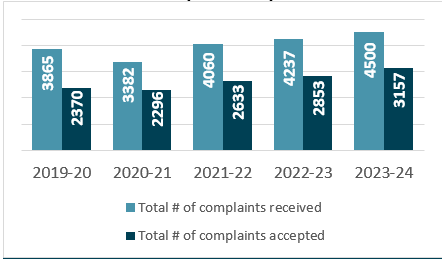
Text Version
| 2019-2020 | 2020-2021 | 2021-2022 | 2022-2023 | 2023-2024 | |
|---|---|---|---|---|---|
| Total # of complaints received | 3865 | 3382 | 4060 | 4273 | 4500 |
| Total # of complaints accepted | 2370 | 2296 | 2633 | 2853 | 3157 |
The breakdown of public complaints filed by RCMP division is available on the CRCC website.
In 2023-24, the 1,295 complaints that were not sent for investigation included:
- Complaints that are outside of the CRCC's mandate*: 878
- Complaints that are trivial, frivolous, vexatious or made in bad faith: 154
- Complaints filed outside the one-year time limit: 128
- Complaints from an individual who was not directly involved and/or was not physically present during the incident: 110
- Complaints that are more appropriately dealt with under other Acts of Parliament (e.g. privacy, human rights, official languages): 19
- Complaints related to RCMP Code of Conduct (discipline) decisions: 2
- Complaints made by RCMP member(s) that could be more appropriately dealt with under another process: 2
- Complaints related to national security: 2
*This includes complaints made about non-RCMP police officers
Of the 4,500 public complaints that were filed, 98% were filed with the CRCC and 2% were filed with the RCMP
Public Complaints Related to National Security
Section 45.53(4.1) of the RCMP Act states:
The Commission shall refuse to deal with a complaint concerning an activity that is closely related to national security and shall refer such a complaint to the National Security and Intelligence Review Agency (NSIRA).
Public Complaints Referred to the NSIRA
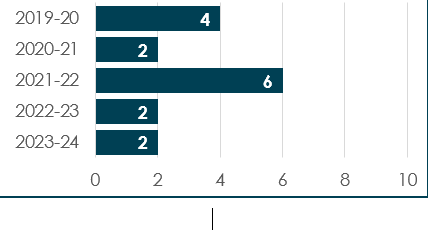
Text Version
- 2019-20: 4
- 2020-21: 2
- 2021-22: 6
- 2022-23: 2
- 2023-24: 2
Finalized Public Complaints
It is important to note that public complaints finalized by the RCMP within a fiscal year are not necessarily related to complaints lodged during that same time period. For example, a complaint that is finalized in June 2023 (FY 2023-24) may have been lodged in December 2022 (FY 2022-23). Complaints can be concluded in multiple ways:
In 2023-24, the CRCC received 3,293 completed complaint files from the RCMP, representing a 51% increase from the previous year. |
Number of Finalized Complaints Canada-Wide
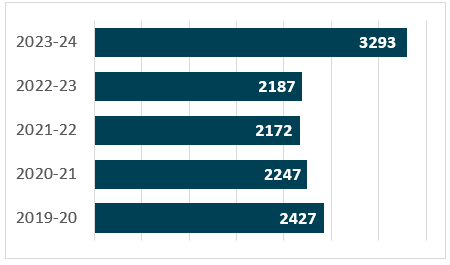
Text Version
| 2019-20 | 2020-21 | 2021-22 | 2022-23 | 2023-24 |
|---|---|---|---|---|
| 2427 | 2247 | 2172 | 2187 | 3293 |
In 2023-24, the 3,293 finalized complaint files contained 8,034 allegations. The top five* allegation categories were:
- Neglect of Duty (3,502)
- Improper Attitude (2,141)
- Improper Use of Force (755)
- Improper Arrest (501)
- Irregularity in Procedure (238)
*A breakdown of how the RCMP addressed the allegations (i.e. substantiated, terminated, withdrawn by complainant) is available on the CRCC website.
Outstanding Public Complaints
Notwithstanding the RCMP's efforts to address the backlog, there were 2,249 active RCMP public complaint investigations as of March 31, 2024, with 1,558 complaint investigations having exceeded the RCMP's internal 120-day service standard.
The chart below indicates the number of outstanding complaints that exceeded the RCMP's service standard by fiscal year.
Number of Public Complaints Investigations that exceeded the service standard
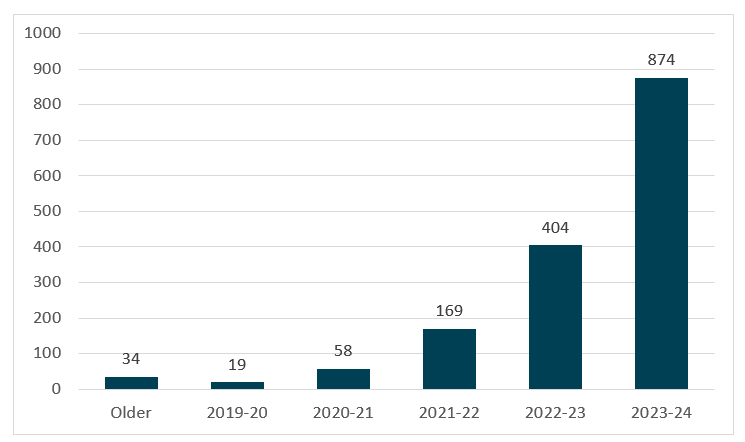
Text Version
Number of Public Complaints Investigations that exceeded the service standard
- Older: 34
- 2019-20: 19
- 2020-21: 58
- 2021-22: 169
- 2022-23: 404
- 2023-24: 874
Reviews of the RCMP's Handling of Public Complaints
If an individual is not satisfied with the RCMP's handling of their complaint, they may request that the CRCC conduct a review of the RCMP's investigation.
In 2023-24, the CRCC received 263 new requests for review from individuals not satisfied with the RCMP's handling of their complaint. Of those, 22 did not meet the criteria for a review.
Requests for Review
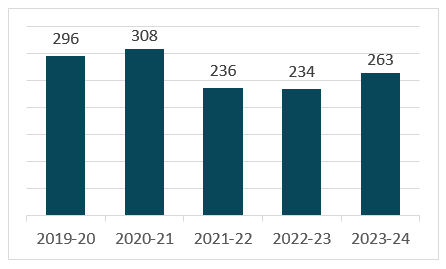
Text Version
Number of Public Complaints Investigations that exceeded the service standard
- 2019-20: 296
- 2020-21: 308
- 2021-22: 236
- 2022-23: 234
- 2023-24: 263
In addition, the CRCC issued 8 Further Investigation notices.
Of these, the CRCC took over 4 of the investigations and requested that the RCMP conduct the other 4 investigations.
In 2023-24, the CRCC issued 246 review reports. Summaries of CRCC finalized complaint reviews are available online. These summaries have been depersonalized in order to protect the privacy of individuals who file public complaints against the RCMP.
The 246 reports were issued as follows:
- 149 Satisfied Reports
- 42 Interim Reports
- 55 Final Reports
| 2019-2020 | 2020-2021 | 2021-2022 | 2022-2023 | 2023-2024 |
|---|---|---|---|---|
313 |
196 |
175 |
184 |
149 |
57 |
48 |
54 |
59 |
42 |
24 |
78 |
174 |
49 |
55 |
394 |
322 |
403 |
292 |
246 |
Findings and Recommendations
In FY 2023-24, the CRCC issued 55 final reports that included:
- 381 findings (212 were adverse)
- 184 recommendations to the RCMP
In response to the CRCC's review reports, the RCMP accepted:
- 96% of adverse findings
- 85% of recommendations
These review recommendations are classified according to 14 categories. Examples of types of recommendations the CRCC can make following the review of a public complaint investigation include:
- RCMP member(s) receive operational guidance from a supervisor
- RCMP issue an apology
- RCMP member(s) receive additional training or review of existing protocol
- RCMP review, amend or establish policy
- RCMP member review the final CRCC report
A description of the 14 review recommendations categories is available on the CRCC website.
Top Five Recommendation Categories for 2023-24

Text Version
Top Five Recommendation Categories for 2023-24
- RCMP member(s) receive operational guidance: 67
- RCMP issue apology: 29
- RCMP member(s) retraining/protocol review: 21
- RCMP member review the final CRCC report: 20
- RCMP policy review/Amendment: 18
CRCC reports outline which of its findings the RCMP has accepted and what remedial measures the RCMP is taking to address them.
The CRCC publishes summaries of these reports to our website.
Strategic Initiatives
Multiple Complaint Subject Member Project
As part of its ongoing effort to hold the RCMP accountable for its activities and the conduct of its members, the CRCC reviewed existing complaint data from April 1, 2018, to March 31, 2023, to identify RCMP members who were the subject of multiple complaints.
A qualitative analysis was performed on members who were the subject of five or more complaints within this period to identify potential trends in their conduct.
The CRCC identified 631 members who were the subject of five or more complaints over the period.
Going forward, the CRCC plans to send an updated list to the RCMP each year, identifying members who have been the subject of five or more complaints over a five-year period.
RCMP members with three or more complaints within a one-year time frame
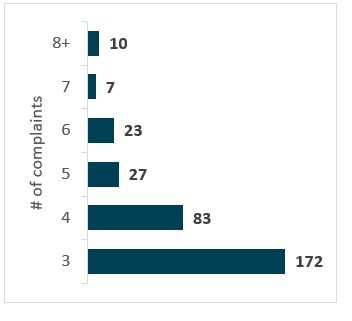
Text Version
RCMP members with three or more complaints within a one-year time frame
- 3 complaints: 172 members
- 4 complaints: 83 members
- 5 complaints: 27 members
- 6 complaints: 23 members
- 7 complaints: 7 members
- 8+ complaints: 10 members
RCMP members with five or more complaints over a five-year period
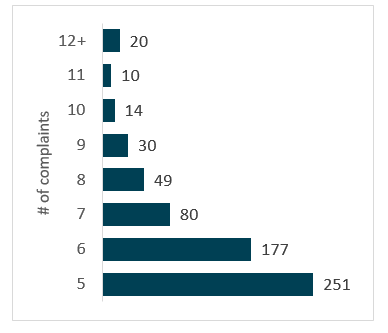
Text Version
RCMP members with five or more complaints over a five-year period
- 5 complaints: 251 members
- 6 complaints: 177 members
- 7 complaints: 80 members
- 8 complaints: 49 members
- 9 complaints: 30 members
- 10 complaints: 14 members
- 11 complaints: 10 members
- 12+ complaints: 20 members
The CRCC also reviewed existing complaint data from April 1, 2022, to March 31, 2023, to identify RCMP members who were the subjects of three or more complaints within a one-year time frame.
The CRCC identified 322 members who fell into this category. For the most part, these complaints were made by different individuals and are connected to separate, unrelated incidents. This information was sent to the RCMP.
As part of this project, the CRCC highlighted members whose conduct was of particular concern.
Areas of concern that could prompt a member to be part of this list include but are not limited to:
- an exceptionally high number of complaints received;
- allegations of use of force causing serious injury; and
- trends of racial bias.
The CRCC's analysis highlighted the following:
- 34 of the 631 members who were the subject of five or more complaints over the period of April 1, 2018, to March 31, 2023, were identified as members of particular concern.
- 16 of the 322 members who were the subjects of three or more complaints within a one-year time frame (April 1, 2022, to March 31, 2023) were identified as members of particular concern.
Some noteworthy allegations included:
- Improper use of force during arrests
- Failure to conduct a wellness check
- Persistent display of improper attitude during traffic incidents
- Bias, discrimination and/or racism
- Improper investigation
The CRCC provides Multiple Complaint Subject Member reports to the RCMP annually for its awareness and whatever action deemed necessary .
Bill C-20: An Act establishing the Public Complaints and Review Commission and amending certain Acts and statutory instruments would give the Chairperson the authority to recommend to the RCMP Commissioner that a disciplinary measure be considered for a member who is the subject of more than one complaint.
Heads of Police Oversight Agencies Annual Meeting
This annual event hosted by the CRCC provides a forum for provincial complaint agencies and serious incident investigative agencies to address issues of mutual concern, discuss how to better share information, and collaborate on improving public awareness of the role of police oversight agencies.
In 2023-24, the agencies discussed:
- media & public engagement strategies
- the impact on oversight agencies of governments amending federal, provincial and territorial police acts and/or introducing new legislation
- how to maximize police governance boards & police oversight agencies working cooperatively
- information sharing & MOUs between police oversight agencies
- role of police oversight in advancing Indigenous reconciliation
- use of video footage by police oversight agencies
Canadian Association of Civilian Oversight of Law Enforcement (CACOLE)
CACOLE is a national non-profit organization involved in the oversight of police officers in Canada. CACOLE is dedicated to advancing the concept, principles and application of civilian oversight of law enforcement throughout Canada and abroad.
As president of CACOLE, the CRCC Chairperson led the 2024 annual conference held in Calgary, Alberta.
Panel discussions addressed topics that included:
- Restorative complaint processes
- Understanding the neurobiological and psychological effects of trauma
- Use of body-worn cameras
- Role of the media in reporting on police-public interactions
- Legal developments impacting policing and police oversight
- Building trust and respect between police oversight agencies and Indigenous police services
- Police unions, oversight agencies and the need to work together
- International comparative research on independent police complaint bodies
To learn more about CACOLE, please visit the website.
Transparency and Accountability
Public Complaint Reviews: Searchable Findings & Recommendations
CRCC reports outline which of its findings the RCMP has accepted and what remedial measures the RCMP is taking to address them.
In order to promote awareness of the work of the CRCC, and to highlight the remedial nature of the public complaint and review process, the CRCC publishes depersonalized* numbered summaries of reports on its website. These include public complaint review reports where the CRCC:
- is satisfied with the RCMP's handling of a public complaint; or
- has issued recommendations for the RCMP
These summaries can be searched by:
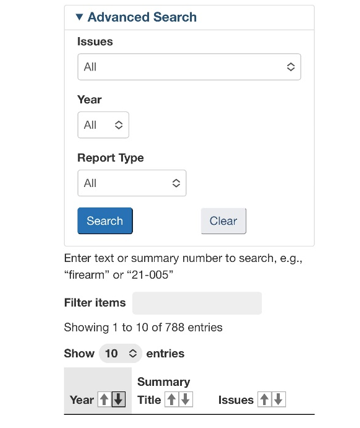
* to protect the privacy of individuals who file complaints
Provincial/Territorial Reports on RCMP Public Complaints
In addition to its annual report to Parliament, the CRCC, per section 45.52(2) of the RCMP Act, is required to submit an annual report to the minister who has primary responsibility for policing in the province or territory, the federal Minister of Public Safety, and the RCMP Commissioner.
The reports must include:
- The number of public complaints filed by RCMP division
- How each complaint allegation was resolved*
- Substantiated by RCMP
- Not Substantiated by RCMP
- Informally Resolved by RCMP
- Terminated by RCMP
- Withdrawn by complainant
- Identification of trends, if any.
Currently, these reports also include a breakdown of the number of:
- Public complaints reviewed by the CRCC;
- The types of recommendations issued; and
- Whether or not the RCMP supported the recommendation.
The reports are published on the CRCC's website.
*Public complaints may contain one or more allegation. A full list of allegations is available on the website.
Administration of the Public Complaint Process
To ensure transparency of the public complaint process, related CRCC policies and agreements are published on the website. These include:
- Policy on the Discretion to Change or Restrict Access to Staff or Services due to Unreasonable Complainant Behaviour
- Policy on the Discretion to Refuse to Deal with a Complaint
- Policy on the Extension of the Time Limit to Submit a Complaint to the CRCC
- Policy on the Closing of Public Complaint due to Incomplete Information
- Memorandum of Understanding between the CRCC and the RCMP
Total Expenditures
| Salaries | 11.4M |
|---|---|
| Operating Costs | 2.7M |
| Employee Benefit Plans | 1.7M |
| Total | 15.8M |
Note: Numbers represented are in millions
Organizational Chart
The CRCC consists of a full-time Chairperson and not more than four other full-time or part-time members, one of whom may be a Vice-chairperson, appointed by the Governor in Council.
A person is not eligible to be a member of the CRCC if that person
- is a member or former member of the RCMP; or
- is not a Canadian citizen or a permanent resident
In 2023-24, the CRCC's senior management team was comprised of:
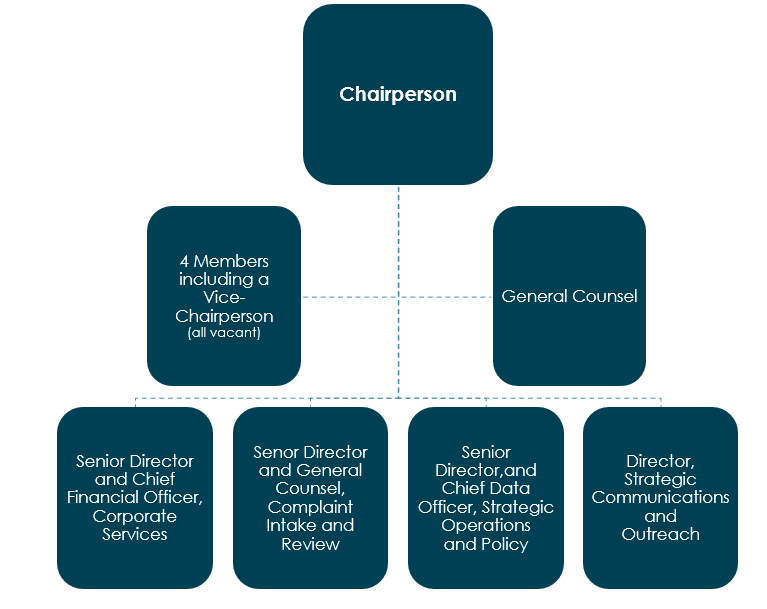
Text Version
- Chairperson
- 4 members including a Vice-Chairperson (on vacant)
- General Counsel
- Senior Director and Chief Financial Officer, Corporate Services
- Senior Director and General Counsel, Complaint Intake and Reviews
- Senior Director, and Chief Data Officer, Strategic Operations and Policy
- Director, Strategic Communications and Outreach
- Date modified:

